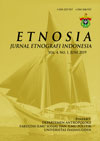Abstract
Interfaith marriage can be called a meeting of inter-social identities specifically within the context of family. It is therefore an indispensable part of the process for every interfaith marriage couple to de-categorize and re-categorize and consolidate their social identity as a couple so that they can successfully define their new family values. The purpose of this study is to analyze how married couples of different faiths in Toraja harmonize their differences from the perspective of social identity. This study used an ethnographic approach with six informant actors from three interfaith families in Toraja. The results show that these married couples operationalize a dual-hierarchical identity model in an inter-family harmonization effort. Tongkonan identity is placed vertically as a collective identity, while the identity of religion as a person-based social identity is placed horizontally. Both of these have consequences for the emergence of a cross-categorized identity.References
Alatas, Z. (2007). Pelaksanaan perkawinan beda agama setelah berlakunya undang undang nomor 1 tahun 1974 tentang perkawinan di Kabupaten Semarang (Tesis). Universitas Diponegoro, Semarang.
Bararuallo, F. (2010).Kebudayaan Toraja: masa lalu, masa kini, dan masa mendatang. Jakarta: Universitas Atma Jaya.
Brewer, J.D. (2000). Ethnography. Philadelphia: Open University Press.
Brewer, M.B. & Gaertner, S.L. (2003). Toward Reduction of Prejudice: Intergroup Contact and Social Categorization. In Brown, R. & Gaertner, S. (eds.). Blackwell Handbook of Social Psychology: Intergroup Processes. Oxford: Blackwell Publishing.
Ellemers, N., Haslam, A. (2012). Social identity theory. Van Lange, P. A. M., Kruglanski, A. W., Higgins, E. T. (Eds). Handbook of Theories of Social Psychology. London: Sage Publication
Faturochman, F. (2015).Model-model psikologi kebhinnekatunggalikaan dan penerapannya di Indonesia.Jurnal Psikologi Indonesia, (1).
Hewstone, M., Rubin, M. & Willis, H. (2002).Intergroup Bias.Annual Review of Psychology, 53, 575-604.
Hogg, M. A., & Abrams, D. (1998).Social identification: a social psychology of intergroup relation and group process. London: Rutledge.
Hogg, M.A., Abrams, D. Otten, S, & Hinkle, S. (2004). The social perpectives: intergroup relations, self-conception and small groups. Journal of Small Group Research, 35 (3), 246-276.
Huang, L.-L. (2016). Interpersonal Harmony and Conflict for Chinese People: A Yin–Yang Perspective. Frontiers in Psychology, 7. https://doi.org/10.3389/fpsyg.2016.00847
Ibad, M.I., Faturochman. (2016). Dinamika identitas sosial pada pasangan perkawinan beda agama (Tesis). Fakultas Psikologi Universitas Gadjah Mada, Yogyakarta.
Konishi, E., Yahiro, M., Nakajima, N., & Ono, M. (2009).The Japanese Value of Harmony and Nursing Ethics.Nursing Ethics, 16(5), 625–636. https://doi.org/10.1177/0969733009106654
Leung, K., Brew, F. P., Zhang, Z. X., & Yan Zhang. (2011). Harmony and Conflict: A Cross-Cultural Investigation in China and Australia. Journal of Cross-Cultural Psychology, 42(5), 795–816. https://doi.org/10.1177/0022022110363474
Murchison, J.M. (2010). Ethnography essentials: designing, conducting, and presenting your research. San Francisco: Jossey-Bass.
Nurcholis, A. (2010). Pernikahan beda agama: kesaksian, argumen keagamaan dan analisis kebijakan. Jakarta: ICRP-Komnas HAM.
Prasetyo, A.D. (2007). pelaksanaan perkawinan beda agama dan akibat hukumnya dalam hubungan dengan undang undang Nomor 1 Tahun 1974 tentang perkawinan. (Tesis.) Magister Kenotariatan Universitas Diponegoro, Semarang.
Rubin, M., & Hewstone, M. (2004). Social identity, system justification, and social dominance: Commentary on Reicher, Jost et al., and Sidanius et al. Political Psychology, 25(6), 823–844.
Rubiyatmoko, R. (2011). Perkawinan Katolik menurut kitab hukum Kanonik. Yogyakarta: Kanisius.
Sastra, A.R.A. (2011). Pengkajian hukum tentang perkawinan beda agama. Jakarta: Badan Pembinaan Hukum Nasional (BPHN) Kementerian Hukum dan Hak Asasi Manusia.
Spradley, J.P. (2006). Metode etnografi. Yogyakarta: Tiara Wacana.
Tangdilintin, L.T. (1975). Toraja dan kebudayaannya. Tana Toraja: Yayasan Lepongan Bulan (YALBU)
Waterson, R. (1986). The ideology and terminology of kinship among the Sadan Toraja.Bijdragen tot de Taal-, Land- en Volkenkunde, 142 (1), 87-112.





